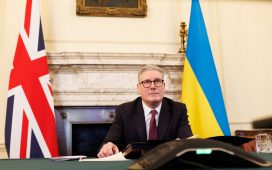A French publisher who was arrested in London on terrorism charges has been awarded “substantial” damages by the Metropolitan police, as new figures reveal thousands of foreign nationals have been stopped at UK ports under anti-terror laws.
Ernest Moret, 29, a foreign rights manager for Éditions la Fabrique, was detained at St Pancras station in April last year on his way to the London book fair.
He was held under section 7 of the Terrorism Act 2000, and questioned by counter-terrorist officers about whether he had taken part in anti-government demonstrations in France and if he backed the French president, Emmanuel Macron.
Moret’s mobile phone and laptop were also confiscated for several weeks, before being returned to him after police decided to take no further action. The police also admitted downloading Moret’s sim card before returning his phone.
Moret and his lawyer, Richard Parry of Saunders Solicitors, pursued a claim for misfeasance in a public office and false imprisonment. To settle the claim without recourse to litigation, the Met has now agreed to pay Moret a five-figure sum plus his legal fees. Parry has also written to the Met commissioner, Mark Rowley, demanding an apology for Moret.
Parry said: “In our view the stop was neither necessary nor proportionate. With the financial compensation settled it is now time for a full apology from the Metropolitan police.”
The move comes after an inquiry by the independent reviewer of terrorism legislation, Jonathan Hall KC, which said the Met’s treatment of Moret was “exaggerated and overbearing”.
Hall said the police should not be using counter-terrorism powers in public order policing. “The rights of free expression and protest are too important in a democracy to allow individuals to be investigated for potential terrorism merely because they may have been involved in protests that have turned violent,” Hall’s report said.
Moret was one of at least 4,525 foreign nationals to be stopped at UK ports from 2020 to 2023, under schedule 7 of the 2000 Terrorism Act, according to daily logs released under freedom of information laws.
Of these, 1,432 citizens were from the UK’s allies in EU member states, including 334 Irish, 192 Dutch, 175 French, 99 Swedes and 94 Germans.
Countries with more fraught relations with the UK had fewer of their citizens stopped. For example, 72 Russians and 32 Chinese citizens were recorded being stopped under the Terrorism Act in the three-year period, the logs reveal.
Of the 8,001 people stopped from 2020 to 2023 whose nationality was recorded, 3,476 or 43.4% were British with the remaining 56.5% coming from almost 100 different countries.
The figures, released by the National Police Chiefs’ Council, are likely to be an underestimate of the foreign nationals stopped under the terrorism act because recording nationality is not a mandatory requirement under the logging system.
The figures have deepened concerns that police are using counter-terrorism powers to target political activists.
Kevin Blowe, campaigns coordinator at the police monitoring group Netpol, said the figures were “genuinely alarming”. He said: “We know these powers are used for purposes other than investigating terrorism, including the targeting of political activists visiting Britain.
“The data does suggest that EU states are seeking the active help of British police to target their own citizens too, although state surveillance is so lacking in transparency and accountability that this is almost impossible to confirm.
“Schedule 7 is discriminatory and draconian, it undermines civil rights and criminalises communities and political dissent. Like so many other counter-terrorism powers put in place a decade ago by the last Labour government, it is something that we would all be better off without.”
Chris Jones, from the European civil liberties group Statewatch, said the figures demonstrate the working links between UK police, their counterparts in Europe and Europol.
He added: “While Europol obviously are responsible for dealing with some seriously harmful activities such as murder and human trafficking, their monitoring of peaceful protest groups is not the kind of thing that the police should be doing in an ostensibly liberal democratic system.
“How they draw the lines between those things is a mystery, but arguably they don’t do a great job of it.”
The Met confirmed the force had reached a settlement with Moret, the details of which were private.
In a statement, the Met added: “We fully cooperated with a review into the circumstances of this case, which was carried out by Jonathan Hall KC, and following the publication of his report, we also voluntarily referred the matter to the Independent Office of Police Conduct (IOPC). The IOPC subsequently directed the Met police to carry out a local investigation and that remains ongoing at this time.
“Schedule 7 is an important power in protecting the borders of the UK and it remains a vital tool in our efforts to counter the terrorist threat and keep the public safe.”
“We remain fully committed to ensuring that we use these powers proportionately and responsibly.












